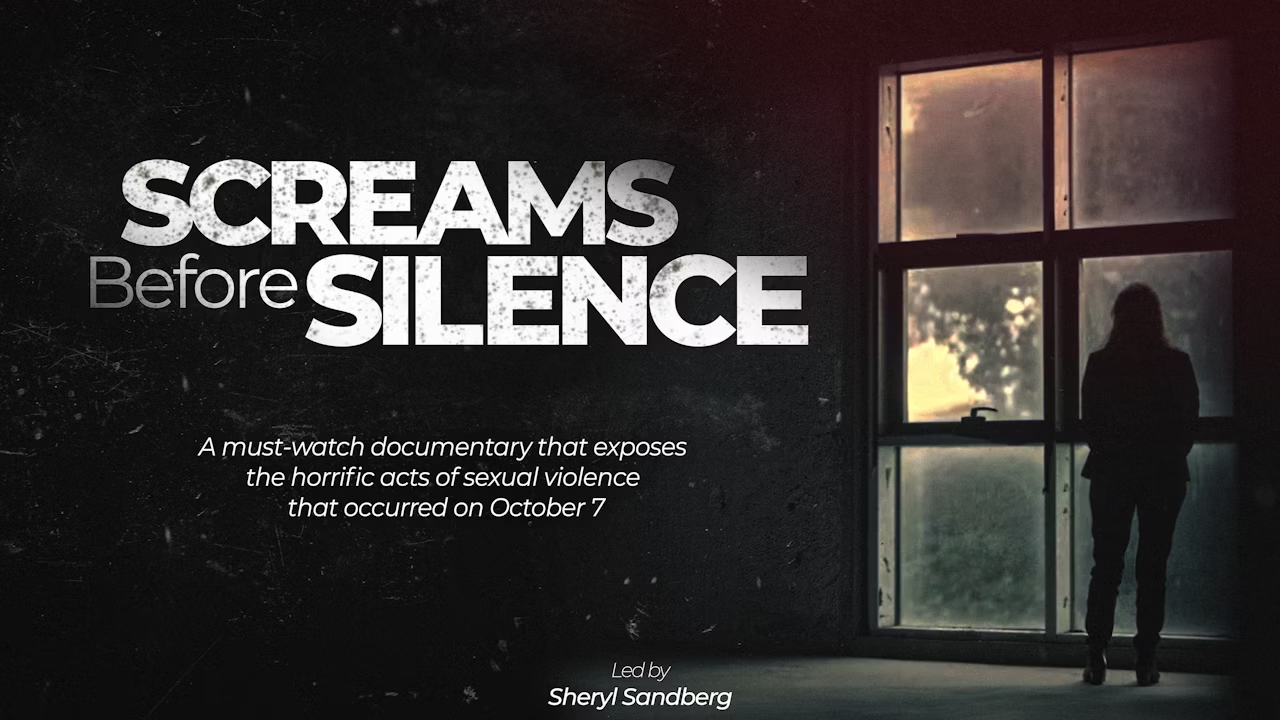Screams Before Silence
The documentary “Screams Before Silence” from Israeli production company Kastina Communications (“Fauda”) comes with a trigger warning. As far as trigger warnings go, it’s pretty understated. But although the film is only an hour long, it’s so hard to watch that it feels like twice that.
To be clear: This is not a criticism of the work itself director Anat Stalinsky has done an incredible job bringing us back to the Oct. 7 Hamas attacks on Israel, which sparked the still raging war in the region.
Stalinsky narrows her focus with almost stubborn specificity on Hamas’ use of sexual violence as a tool of war. She starts by showing us burned-out homes, shot by cinematographer Sasha Gavrikov, they have an eerie beauty in their starkness that calls to mind nothing so much as a horror movie, which is what this is. Please note that no review of any film this explicit can come without its own intense trigger warning.
Our guide through these remains is a visibly emotional Sheryl Sandberg, former COO at Meta and author of feminist manifesto “Lean In.” Walking through the rubble-strewn streets of demolished Kfar Aza kibbutz with two former residents Chen Goldstein Almog and her teenage daughter Agam, who were kidnapped last Oct. 7 and held hostage for 51 days Sandberg seems remarkably composed.
But we don’t understand just how emotionally challenging this moment must be for them until Agam stares at the floor while talking about her father: “And I didn’t say goodbye to him, or hug him, or kiss him,” she says quietly, recalling their last moments together before he and her sister were shot and she and her mother were taken away. “I looked at her,” she adds. “And said, ‘Mom, they’re going to rape me now.’”
There are many such memories throughout the film, from women and others traumatized by violence around them. Sandberg visits the site of the Nova music festival with Tali Binner, who steps back into the tiny trailer where she hid for seven hours.
Binner takes a few deep breaths. She starts to talk, “I could hear many women’s voices. A girl shouted ‘Please stop, stop, stop’ for a long time. And it doesn’t.” And then it does and there is nothing else but quiet. “Then I started thinking, what’s worse: to be kidnapped, raped or shot? What’s worse? What’s better?”
Sandberg tells Binner she is shocked that she can even speak about this at all, let alone so openly. Binner answers: “I decided to talk about it after I heard that people are trying to say it didn’t happen. I won’t forgive myself if people are still saying those things [and] I know that it did.”
That desire echoes in former hostage Amit Soussana’s words. “If I can help the people who are still there,” Soussana says after telling her story of being held captive by Hamas for eight months, “I want to.” (According to reports, there are currently around 130 Israeli hostages being held by Hamas.)
It is this sense of duty that runs through the entire film; one person after another re-experiencing terrifying events in order to create an unignorable record of them. Stalinsky focuses almost exclusively on sexual assaults, she approaches the subject with artistic restraint and from every straightforward angle she can think of — as if, Binner says at one point, she fears it will be too easy for people ignore. Alongside interviews and photos and footage taken by Gavrikov we see much footage taken by and of Hamas soldiers themselves which baldly corroborate the women’s stories.
Many of these accounts are so grotesque as to be unprintable; occasionally (inevitably) speakers’ controlled compartmentalization breaks down such as when Michal Ohana hears what sounds like a rocket explode outside during her interview. Ohana, too, was at the music festival.
Shari Mendes who had to identify disfigured bodies in the days after the attack acknowledges that there may be a disparity between what she is saying and how she looks. “I must seem like I’m disciplined, and cool and calm,” she allows. “I’m not. But if I start to be emotional, I may not be able to continue.”
Sandberg herself cannot maintain her composure looking at photos of victims that are too graphic to be shown on-screen. “This is the most important work of my life,” she says. “Maybe everything I’ve done has led to this.”
But the truth is that even while she’s there, Sandberg unlike so many people in Israel and Gaza right now retains the luxury of safety. It’s the women she meets who have seen what they see today; all we can do from here (wherever we are) is listen.
Watch Screams Before Silence For Free On Gomovies.


.jpg?w=1024&resize=1024,1024&ssl=1)
.jpg?w=1024&resize=1024,1024&ssl=1)
.jpg?w=1024&resize=1024,1024&ssl=1)
.jpg?w=1024&resize=1024,1024&ssl=1)
.webp?w=1024&resize=1024,1024&ssl=1)
.jpg?w=1024&resize=1024,1024&ssl=1)
.jpg?w=1024&resize=1024,1024&ssl=1)
.jpg?w=1024&resize=1024,1024&ssl=1)